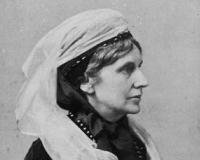The Oxford sex ring: dhimmitude meets decadence
by - 15th May 2013
‘I was desperate to get away but I was too terrified: they threatened to chop my son's head off and put it in a suitcase, and then kill me and my mum.
'I knew they would do it, too. They're not human,' she said. 'I have no doubt they would have killed me and done it painfully and slowly.’
This is not the testimony of a refugee fleeing a particularly vicious outbreak of retaliatory warfare in Syria, or a victim of a salafi kidnap attempt in Somalia – scenarios from the bottom of the world that sadden each day’s newspaper trawl.
 This happened in Oxford, and as the lone policeman who doggedly brought the cases to light, Simon Morton, then detective chief inspector, said: ‘This was happening in Oxford – the city of dreaming spires. If it was happening there, the ramifications for all cities are huge’.
This happened in Oxford, and as the lone policeman who doggedly brought the cases to light, Simon Morton, then detective chief inspector, said: ‘This was happening in Oxford – the city of dreaming spires. If it was happening there, the ramifications for all cities are huge’.
16-year-old Child C told her story to the Guardian after the trial of seven men on charges including rape, conspiracy to rape, trafficking for sexual exploitation and facilitating child prostitution ended with their conviction at the Old Bailey yesterday (Tuesday). Their names: Bassam and Mohammed Karrar, Akhtar and Anjum Dogar, and Assad Hussain, Zeesha Ahmed and Kamar Jamil.
All those accused of sex crimes including some too horrific even to be reported, according to the Times’ Andrew Norfolk, were Muslims from Pakistan and North Africa.
Girl C was reluctant to draw wider conclusions from this fact and that all their victims were white, says the piece by Amelia Hill.
"Not all the men are Asian: at least two are Egyptian," she said. "They are, though, all Muslim – but not all Muslim men behave like that."
Adds the Guardian: ‘There did, however, appear to be a subset of Muslim men in Oxford who targeted white girls.’
Does this make it a racial crime? Or a religious one? Or just a ‘night-time economy crime’ as the Guardian’s Vikram Dodd concludes? Well you decide from this and the other similar cases in Rochdale and Derby and elsewhere.
The Qur’an itself has verses which quite clearly have acted down the aeons to ‘cover’ evil of this kind, as mishandled texts in the Bible about blackness helped to create an intellectual atmosphere in which apartheid and slavery could become a way of life.
This verse is at the root of an attitude to women that is very particular to historic inter-religious and inter-cultural contest.
Qur’an 24:34 says: ‘Do not compel your slave girls to prostitution, when they desire to keep chaste, in order to seek the frail good of this world's life; and whoever compels them, then surely after their compulsion Allah is Forgiving, Merciful.’
Allah forgives the girl – for her own rape - but says nothing about the man. But what sort of girl? Slave girls were by definition non-Muslim i.e. pagans or Christians.
When is it justified to make non-Muslim girls your slave? When you have conquered their people.
As an Anglican priest who has made a six-year study of the Qur’an in Arabic at doctoral level says: ‘This is not decadence meets opportunism, but dhimmitude meets opportunism.’
Textual interpretation
Muslim men coming into the UK, he says, still habitually think of non-Muslim women as their ancestors did.
‘The worldview of dhimmitude cannot be eradicated by simply crossing an ocean. African-Americans are no longer slaves, but the racism generated by slavery still persists,’ he says.
Dhimmitude is the second-class status afforded to non-Muslims or conquered peoples in Muslim states. A dhimmi is one who lives under the dhimma or concessionary charter (Jacques Ellul’s phrase in the introduction to Bat Ye’or’s The Dhimmi) offered to peoples of other religions – originally Jews and Christians – aftr conquest. It concedes rights to protection of life, property and religious practise, but in this verse, such protection is limited by God himself.
Dhimmitude and the attitudes that are inherited as a result of it have a long historical hinterland that religious literacy proponents throughout our system need to take very seriously indeed.
Of course, it is perfectly possible to be a Muslim and eschew such verses as belonging to a specific time and place, as it is possible to be a Hindu and ignore the laws of Manu about women achieving moksha or liberation only by re-birth as a man first – which was an impossibility as even in death a woman’s purpose was to glorify her ‘lord and master’.
Or to be a Christian and overlook the fact that St Paul told slaves to obey their masters, rather than masters to free their slaves.
But texts work on us in particular ways. In the case of slavery in the Bible for example, the impulse towards freedom is there in the very Pauline notion of kenosis – God voluntarily rendering himself as powerless as a slave for humanity’s sake, to make it free in Jesus (Philippians 2). But it had skant effect on Christian plantation owners.
The infamous treatment of women in the scriptures which accounted for suttee (sati) or widow burning in India is, despite even quite contemporary exceptions in remoter corners of the sub-continent, largely eradicated now, while attitudes of female worthlessness persist. (See here for a rigorous account of scriptural sanction for this practise both in the Vedas and other religious literature.)
Clearly religions provide within themselves powerful resources for surmounting cultural shackles – or reinforcing them. How texts work and what makes people buy into them is a hugely under-researched field.
But we must at least recognize there is an effect.
It is not good enough simply to divorce human beings from influences that shape them and say, these men were criminals; Islamists are criminals; slave-owners are criminals.
Criminals like the rest of us do not exist in a cultural void. We are all responsible for inculcating and reinforcing each other’s values.
Sadly, religious texts have been used as much as anything else to provide sanction for the most abject human impulses. Sophisticated forms of Qur’anic interpretation are not the intellectual tools of choice for the average Pakistani kebab vendor.
Bible teaching no longer filters into our schools and so-called ‘care’ homes where ‘sex when you feel comfortable about it’ is as good as the teaching sometimes gets.
Where it is normative for the body to be regarded as something other than a means of physical pleasure or pain or power, campaigners for say, the protection of women from state-sanctioned kidnap, have something to go on.
 This is what influenced the evangelical Josephine Butler’s crusade against enforced vaginal examinations of single women in the 1860s. She ran an exhaustive and eventually successful campaign against the British government over the Contagious Diseases Acts which put all single women under suspicion of prostitution and made such inspections lawful.
This is what influenced the evangelical Josephine Butler’s crusade against enforced vaginal examinations of single women in the 1860s. She ran an exhaustive and eventually successful campaign against the British government over the Contagious Diseases Acts which put all single women under suspicion of prostitution and made such inspections lawful.
Quranic verses on the inherent value of women are inspiring similar campaigns by activist and scholar Nasreen Rahman and others against forced marriage.
Debased attitudes absorbed from the street in faraway countries from youth upwards are beginning to show up English culture and its pernicious indifference towards children and sex.
They used to say that you can tell a civilization by its attitude to the weakest.
The kebab shop crooks are on a spectrum of socially reinforced ‘sexploitation’ that also gave us Jimmy Savile, Gary Glitter and Stuart Hazell, not to mention pedophile priests by the thousand.
Clearly we urgently need better cultural sources and more resolve in activating them than the BBC and the Department for Education and Science supply, if we are to mend the shattered imago dei in us all.
- Log in to post comments
